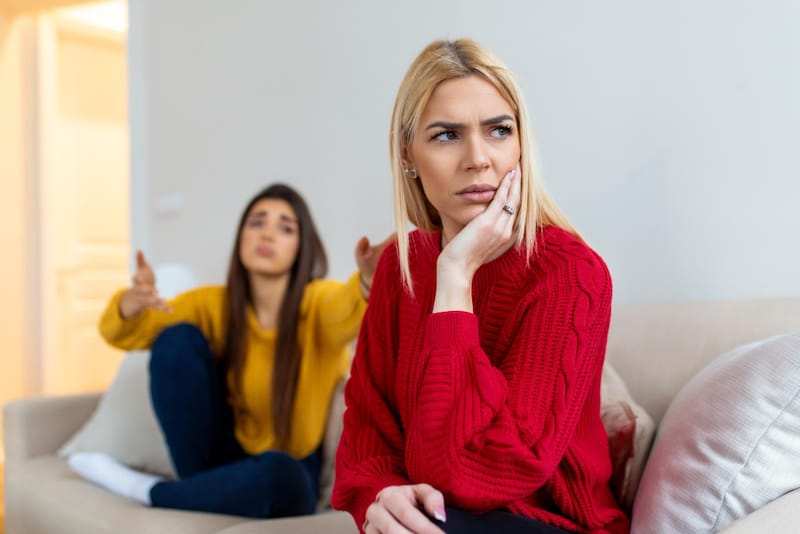Sometimes people around us can unintentionally trigger our anxiety. Usually, it’s a person who doesn’t respect our boundaries, pressures us into certain things, or drains us emotionally. The first step is identifying this individual and recognizing what behaviors or actions trigger your anxiety. Talking to them openly and communicating your feelings can help them come to terms with the issues. Creating healthy boundaries is vital. If you can’t achieve this, seeking help from a therapist who can help you recognize your feelings and the behaviors responsible for anxiety can also help you deal with the person.
Anyone who feels anxiety knows the warning signs. Occasional anxiety is normal, but with an anxiety disorder, they might have intrusive thoughts or concerns regularly caused by specific events in their life, known as triggers.
These triggers come in various forms, and one of them could be a person. A particular individual in your life can trigger your anxiety, be it your boss, best friend, or even boyfriend.
Let’s learn what type of individual can cause anxiety to trigger and how to deal with this specific person to reduce your anxiety.
What are anxiety triggers?
According to the Anxiety and Depression Association of America, about 40 million people are affected by it in the United States
Types of anxiety disorders include:
- Generalized anxiety disorder
- Obsessive-compulsive disorder
- Panic disorder
- Post-traumatic stress disorder
- Social phobia
There could be a combination of factors at play here that could trigger anxiety in an individual, but sometimes a person might be a trigger for mental and physical symptoms.
One person might have various triggers. While a person can act as a trigger, there’re other common triggers such as health issues, medications, caffeine, traumatic events, stress, and other personal triggers, to name a few.
What kind of person can cause anxiety?
Learning a person in your life is making your anxiety worse is an excellent first step toward solving the issue.
But before we learn how to deal with anxiety caused by a person, it’s only fitting to know what kind of a person could be causing it in the first place.
Someone who doesn’t respect the boundaries

We all have this person in our lives who just doesn’t know how to respect personal boundaries and would randomly appear whenever and wherever they please without other person’s consideration.
This could be a boss who won’t leave you alone even after office hours or a friend who will call you at 2 am to discuss their relationship issues.
This kind of person doesn’t understand that you have the right to say no and would still break the boundaries.
They cross boundaries by not listening to what you want but only focusing on what is suitable for them. They can be difficult to reason with, especially if they’re your boss or someone close to you.
When our boundaries are ignored repeatedly, this could cause major discomfort, uncontrollable worry, fear, irritable mood, muscle tension, physical discomfort, and even panic attacks, all of which are common symptoms of anxiety.
People with anxiety disorders have their daily life fixed with a schedule suitable to their needs that work best for their anxiety.
When this structure is pierced, it can make things go south quickly.
Someone who makes you feel pressurized
Notice the person who acts as a trigger if they are pressurizing you.
Someone who makes you uncomfortable or forces you into a situation you don’t want to be in either emotionally or physically is the person who could be the one.
People with a social anxiety disorder are more prone to this kind of trigger as they worry about social situations before, during, and after.
It could be an event your friend is forcing you to go with to “cure” your anxiety symptoms or someone pressuring you into drinking alcohol or smoking, both of which are red flags and can trigger your anxiety.
Someone who emotionally drains you
Even for a person without anxiety, it’s challenging to handle a person who always asks and asks with nothing in return to provide, draining the other person emotionally.
Such a person can be pretty overwhelming for people with this mental health condition.
Anxiety is a combination of many triggers, and it could cause a lot of unnecessary stress, which can end up exhausting you emotionally.
You want to avoid an overwhelming situation where you’re someone’s emotional punching bag.
Such a person could ask you to listen to their problems constantly without paying attention to your emotional needs, and this repetitive act can drain you mentally.
What to do when someone’s causing you anxiety?
A bigger step toward dealing with anxiety is recognizing the triggers, and in this case, when you realize a person is a trigger, you need to take the necessary steps to deal with it.
1. Creating healthy boundaries
One way to deal with such a person is to create healthy boundaries. Ultimately, it’s you who’s allowing a certain kind of behavior.
While it’s easier said than done, creating healthy boundaries can help you maintain your self-respect and understand what not to allow.
2. Identify the reason
Sometimes we know a person is terrible for our anxiety but don’t know in which way.
Observe this person and see which behavior they display or a particular action causing issues for you. Knowing the root cause of the problem makes you more prepared and ready to handle the situation and find a suitable solution.
3. Talk to the person

Talking to this person is easier if it’s a personal relationship, and you can be open about how their actions make you feel. Tell them you need space for the time being and the need to solve this issue gradually by communicating.
When you express yourself directly but respectfully, they will also try to avoid doing whatever they’re doing around you that’s causing you anxiety.
Instead of blaming them, using “I” statements is helpful to let them know how they’re making you feel and what it’s doing for your mental health.
You need to handle the situation differently if it’s a person in an authority position like your boss or colleague.
For a colleague, try to limit the conversation to work and stop indulging in personal conversations. When it comes to your boss, you can’t do a lot, but if you have a cordial relationship with them, maybe you can talk it out.
See if work is causing you anxiety or your boss’s behavior. If communicating doesn’t work, switching jobs and finding a place that caters to your mental needs is better.
4. Severing your relationship
It’s better to hope the situation never comes to this.
If you have done everything in your power to get the message across and the person still doesn’t stop doing what they were, the last option is to consider severing your ties.
It’s not easier to end your relationship, especially if they’re close to you, and nearly impossible if they’re your blood relative.
But if they refuse to try and can’t control their words or actions around you, triggering your anxiety, you might have to follow up on it.
5. Seeking professional help
Sometimes we are so mentally exhausted from dealing with people triggering our anxiety that we need to seek a mental health professional.
A therapist can help you identify the issues and find effective treatments and what you can do on your behalf to relieve your anxiety.
FAQs
What are signs of a relationship causing anxiety?
While people might fight with each other over time, for it to be bad enough to trigger anxiety, there’re some specific signs of behavior you might want to avoid.
– If you have to think a lot before saying anything in a way that feels like walking on eggshells
– If the person is manipulative and isn’t willing to compromise on anything
– Constant fighting and arguments and a new fight occur before solving the previous issues
– An abusive relationship, either mentally or physically
– You constantly feel worried about the relationship
– If you’re the only person putting too much effort into the relationship
Can a friend give you anxiety?
Yes, even a good friend can unintentionally give you feelings of anxiety by behaving in a certain way or saying something that could trigger your anxiety.
Or your friend could be toxic, and it’s very well masked. It could be anything from constant criticism to competition, deception, exclusion, and manipulation, to count a few.
You need to actively see how your body and mind react around them and how your behavior around them is different than with a friend with a healthy friendship.
There are signs that you don’t feel comfortable around your friend.
Can a spouse trigger anxiety?
Yes, your spouse can trigger your anxiety and make it worse. There could be various issues responsible, like disagreements and miscommunication.
There need to be healthy boundaries and open communication to solve the issues. But your partner could also be discretely manipulative, and you might not realize you’re in a toxic relationship.
If you cannot find the root cause of the anxiety trigger, it’s better to see a therapist who can help you through it.
To summarise
Coming to terms with someone close to you is triggering your anxiety is one of the hardest things to do. But taking this first step in recognizing it is better for your anxiety in the longer run.
The hardest part is communicating it to them and arriving at a better solution for your mental health. It wont be easy, especially if the person in the question is naturally toxic, for they would still try to manipulate you.
If you’re unable to solve the issue and talking to this person isn’t going anywhere, it’s best to seek help from a third person who is a professional. A therapist can help you in many ways to improve your anxiety.


